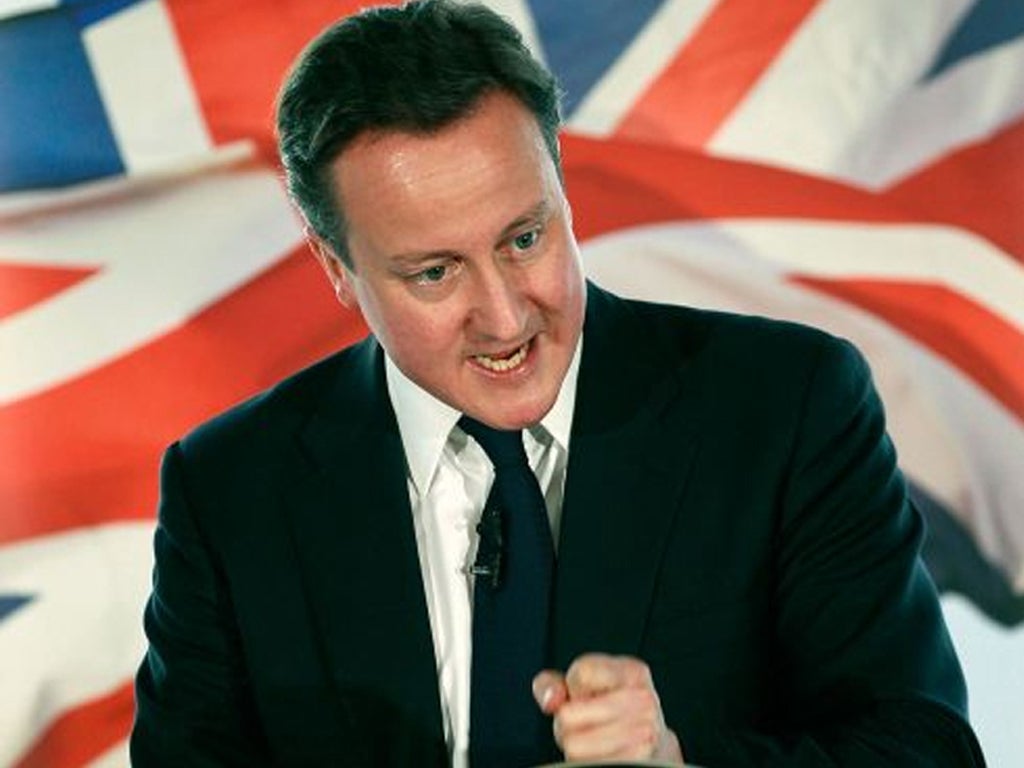The £1m question: Will Cameron really tackle bonus excess?
PM backs move to strip Sir Fred Goodwin of knighthood but current boss of RBS may still win seven-figure payday

David Cameron pledged yesterday to tackle "the crisis of capitalism" but was immediately forced on the defensive over the level of bonus payments at state-funded banks.
The Prime Minister promised to keep a lid on bonuses at the Royal Bank of Scotland and Lloyds Banking Group. Despite his tough language, Stephen Hester, the RBS chief executive, could still be in line for a bonus of about £1m on top of his £1.2m salary.
The RBS board wants to reward Mr Hester for his part in turning the bank around by giving him a windfall of between £1.3m and £1.5m for 2011. But ministers are nervous about the public reaction because RBS was bailed out with £45bn of taxpayers' money.
The bank's remuneration committee is due to meet next week and a bout of arm-wrestling with the Government looks inevitable. RBS said it was "premature" to speculate and a final decision is expected next month.
Mr Cameron said if there was a bonus for the chief executive it would "be a lot less than it was last year", when Mr Hester received a £2.4m top-up. A £1m bonus would be controversial because the bank's share price has fallen by 43 per cent in the past year.
Mr Cameron said cash bonuses at RBS would be limited to £2,000, the same as last year. The body that controls the Government's bank stakes, UK Financial Investments, rejected an RBS plan for a bonus cap of £50,000 in cash. But the cash ceiling would not stop the proposed £1m reward for Mr Hester being paid in shares.
Mr Cameron was on safer ground as he endorsed calls by MPs in all parties for Sir Fred Goodwin, the former RBS boss, to be stripped of his knighthood after steering the bank to the brink of collapse. He was honoured for "services to banking" under the previous Labour Government. "There is a Forfeiture Committee, in terms of honours, that exists and will now examine this issue," Mr Cameron said. "It is right that it does so. It is right that there is a proper process."
Mr Cameron also set out his vision for a new "popular capitalism" in which he accepted a role for state intervention but mounted a strong defence of the free market. He said: "Open markets and free enterprise are the best imaginable force for improving human wealth and happiness. They are the engine of progress, generating the enterprise and innovation that lifts people out of poverty and gives people opportunity. And I would go further: where they work properly, open markets and free enterprise can actually promote morality."
Mr Cameron admitted the link between risk, reward and effort had been broken but insisted: "We won't build a better economy by turning our back on the free market. We'll do it by making sure the market is fair as well as free."
Markets would be made to work "by empowering shareholders and using the power of transparency", the Prime Minister said, adding: "While of course there is a role for Government, for regulation and intervention, the real solution is more enterprise, competition and innovation."
Mr Cameron said the Tories were well placed to "use this crisis of capitalism to improve markets, not undermine them". He said: "We get the free market; we know its failings as well as its strengths." He cited two principles that had been at the centre of Conservative thinking for centuries – social responsibility and a genuinely popular capitalism. Mr Cameron said the 12 million members of co-operatives were a vital branch of popular capitalism.
To sweep away the barriers to setting up co-ops and allowing more workers to have a stake in their companies, he said 17 separate pieces of legislation would be simplified in a Co-operatives Bill.
Ed Miliband said Mr Hester's potential bonus indicated the Government was "not acting in a way its rhetoric would suggest".
The big debate: Should Hester get a £1m-plus bonus?
* The argument for RBS might be worse off without him. Mr Hester inherited a collapsing bank and can claim he is putting the bank on a surer financial footing, ending unprofitable lines of business and cleaning up the balance sheet. It has also been suggested that a banker of his quality could command a larger compensation package elsewhere.
* The argument against The RBS share price halved in 2011, meaning taxpayers, who bailed out RBS in 2008, are sitting on a paper loss of some £20bn – to pay Mr Hester a bonus would be rewarding failure. Could he earn more at another bank? Well, that just shows how out of control banking pay is. The Government should set an example where it can.
Subscribe to Independent Premium to bookmark this article
Want to bookmark your favourite articles and stories to read or reference later? Start your Independent Premium subscription today.

Join our commenting forum
Join thought-provoking conversations, follow other Independent readers and see their replies